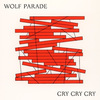Wolf Parade
Cry Cry Cry
[Edit this Release]
- Artists:
- Wolf Parade »
- Label:
- Sub Pop »
Release Date:
06/10/2017
- Artists:
- Wolf Parade »
- Label:
- Sub Pop »
Staff Reviews

Wolf Parade - Cry Cry Cry
Wolf Parade have re-found that spark»
Buy now from:
The band itself is almost a fifth member of the band, something more or at least different than the sum of its parts,” says Wolf Parade’s Spencer Krug. “We don't know who or what is responsible for our sound, it's just something that naturally and consistently comes from this particular combo of musicians.” That sound—complex yet relatable, an energetic brew of glam, prog, synth-rock, and satisfying discomfort—helped define 2000s indie rock with three critically celebrated albums, and propelled a growing Wolf Parade fandom even after the band went on hiatus in 2010. A cautious reunion in 2014 led to the release of EP 4 last year and a handful of headlining shows that drew thousands. And now Wolf Parade is back with Cry Cry Cry, their first full-length album in seven years, and a world tour along with it. The band’s first album produced by Pacific Northwest legend John Goodmanson (Bikini Kill, Sleater-Kinney, Unwound) at Robert Lang Studios outside of Seattle, Cry Cry Cry is undeniably Wolf Parade—but with the renewed focus and creativity of a band that took the time to get exactly where we needed to be. The album takes the best parts of what makes Wolf Parade so uniquely electric—the soaring choruses, rousing anthems, sprawling guitars, and chaotic keys—and finds a way to allow the best compositionally prog elements a firm seat at the table. It’s also a homecoming to Sub Pop, which released all three of the band’s previous albums. In their time apart, the band scattered geographically and focused on family and other work – Spencer on his solo project Moonface, Dan Boeckner on his bands Handsome Furs, Operators, and Divine Fits (with Spoon’s Britt Daniel), Dante De Caro on records with Carey Mercer’s Frog Eyes and Blackout Beach, and Arlen Thompson on being a dad and working a “normal” job. This break allowed for an even stronger, tighter Wolf Parade to emerge, if not exactly pick up where they left off. “All of our albums are always a reaction to our last one,” says Arlen. “Expo 86 (2010) was about as sparse as we get, and this time we wanted to make the palette a little larger.” Cry Cry Cry is deliberate in its arrangements and embrace of the studio process. The result is songs like Valley Boy, a Bowie-inflected anthem for which Spencer wrote lyrics after Leonard Cohen died the day before the 2016 election. You’re Dreaming, also influenced by the election and the spinning shock that followed, is driving, urgent power pop that draws from artists like Tom Petty and what Dan calls one of his “default languages” for writing music. The swirly, synth-heavy crescendo of Artificial Life takes on the struggle of artists and at-risk communities. The album carries a sense of uprising that is not unrelated to Wolf Parade’s renewed determination to drive the band forward in uncertain times.
description from www.roughtrade.com

